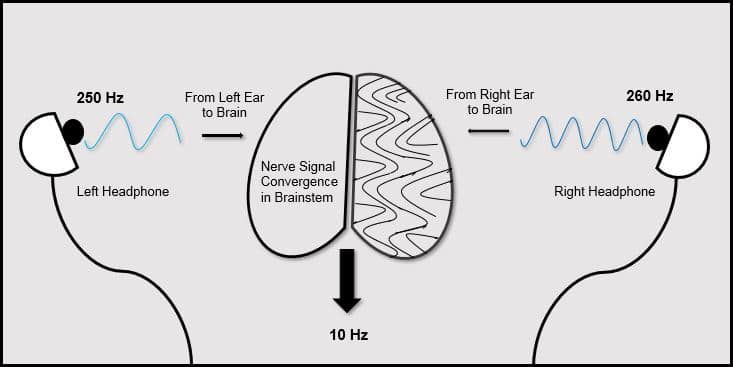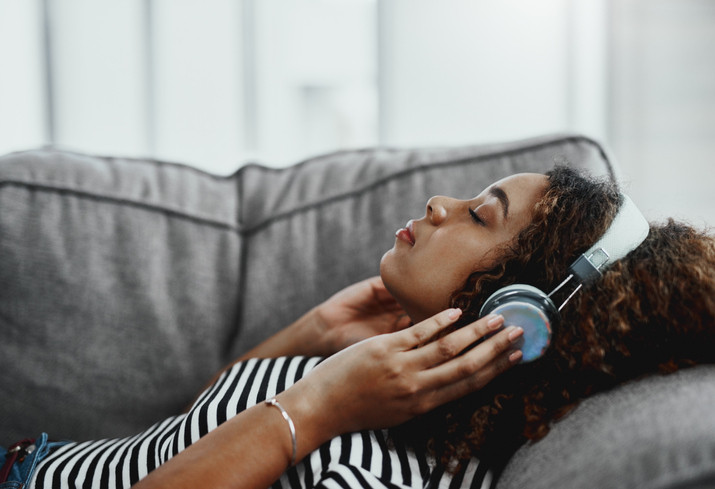Binaural beats have become increasingly popular in the wellness community, particularly for improving focus, sleep, and reducing anxiety. But with their rise in usage comes a common question: Are binaural beats safe? In this article, we’ll explore everything you need to know about binaural beats, their benefits, potential risks, and scientific backing to help you make an informed decision.
What Are Binaural Beats?
Binaural beats are a phenomenon that occurs when a distinct frequency is played in each ear. The brain perceives a third frequency, the binaural beat, which can encourage relaxation, improve concentration, and potentially lead to altered states of consciousness. To fully experience these effects, it’s important to use high-quality headphones.

These beats are categorized into different brainwave frequencies, which correspond to various mental states:
- Delta Waves (1-4 Hz): Deep sleep and restorative states
- Theta Waves (4-8 Hz): Deep meditation, relaxation, and creativity
- Alpha Waves (8-14 Hz): Relaxed focus, light meditation
- Beta Waves (14-30 Hz): Active thinking and alertness
- Gamma Waves (30-100 Hz): High-level cognitive functioning, peak performance
Binaural beats are often used in meditation, sleep aids, and focus-enhancing apps. They claim to influence mental states, but the critical question remains: are binaural beats safe?
Are Binaural Beats Scientifically Proven?
Yes, binaural beats have been scientifically studied and shown to have effects on brain activity. Several research studies have demonstrated that binaural beats can influence brainwave patterns and may lead to enhanced relaxation, better sleep, improved focus, and reduced anxiety.
For instance, studies have found that alpha and theta frequencies (typically used for relaxation and creativity) can promote mental calmness and improve cognitive function. On the other hand, beta waves have been associated with improved concentration and alertness.
However, it’s important to note that while there is scientific evidence supporting the benefits of binaural beats, the results vary depending on the individual, the frequency used, and the specific goals.
Benefits of Binaural Beats
Binaural beats are known for their many potential benefits. Here are a few key advantages:
- Reduced Stress and Anxiety
Studies suggest that binaural beats in the alpha range (8-14 Hz) can promote relaxation and reduce stress. Listening to these frequencies may help in managing anxiety, lowering cortisol levels, and achieving a calm, centered state. - Improved Sleep Quality
Binaural beats are commonly used to aid sleep, particularly with delta waves (1-4 Hz). These frequencies can support deep, restorative sleep by syncing brainwaves to the frequency associated with non-REM sleep stages. - Enhanced Focus and Mental Clarity
Listening to beta waves (14-30 Hz) can promote alertness, helping improve concentration, focus, and mental performance, which is beneficial for work or study. - Increased Creativity
Theta waves (4-8 Hz) can stimulate creativity and support deep meditation, leading to greater insights, innovation, and problem-solving abilities. - Emotional Healing
Some studies suggest that binaural beats may also assist with emotional regulation, helping individuals overcome negative thought patterns or past trauma.
Are Binaural Beats Safe?
While binaural beats are generally considered safe for most people, there are a few considerations to keep in mind:
- Individual Sensitivity
The effects of binaural beats can vary depending on the individual. Some people may experience enhanced relaxation or focus, while others might feel discomfort, dizziness, or headache. If you’re trying binaural beats for the first time, it’s a good idea to start with a short session and monitor how you feel. - Pregnancy and Epilepsy
If you are pregnant or have a history of epilepsy or seizure disorders, it is recommended to consult a healthcare professional before using binaural beats, especially those that use high-frequency beta or gamma waves. These frequencies can have a more pronounced effect on brain activity, which may not be safe for those with certain medical conditions. - Not a Replacement for Medical Treatment
While binaural beats can be helpful for reducing stress and improving mental clarity, they should not be used as a substitute for medical treatment or therapy, especially for serious conditions like chronic anxiety, depression, or sleep disorders. Always consult a healthcare provider for professional advice. - Hearing Concerns
For individuals with hearing issues, the use of binaural beats may not provide the desired effect. It’s crucial to use headphones in a safe volume range to avoid any hearing damage, as long exposure to high volumes can cause hearing loss.
How to Safely Use Binaural Beats
To maximize the benefits and ensure safety when using binaural beats, consider these tips:
- Use High-Quality Headphones: Binaural beats work by playing two different frequencies through each ear, so high-quality headphones that provide clear sound are essential. See our list of best Binaural beats headphones.
- Start Slowly: If you’re new to binaural beats, start with short sessions (10-20 minutes) to see how you respond. Gradually increase the duration as you become accustomed to the experience.
- Choose the Right Frequency: Select the frequency that aligns with your goal (relaxation, focus, creativity, etc.) to achieve the desired effect.
- Listen at a Comfortable Volume: To protect your hearing, ensure you’re listening at a moderate volume and avoid prolonged sessions at high volumes.

Potential Risks and Considerations
While binaural beats are generally safe for most individuals, there are some risks to be aware of:
- Overstimulation: Listening to high-frequency binaural beats (like gamma waves) for extended periods may lead to overstimulation and result in feelings of agitation or anxiety. Take breaks when using these frequencies.
- Disruption of Sleep Patterns: While binaural beats can aid sleep, overuse of stimulating frequencies, such as beta waves, before bedtime may interfere with your ability to fall asleep.
Final Thoughts
In general, binaural beats are safe for most people and offer a range of potential benefits, including improved relaxation, focus, sleep, and emotional well-being. However, individual responses can vary, and certain groups (such as those with epilepsy or hearing issues) should exercise caution.
The science behind binaural beats is still evolving, but there is significant evidence that supports their positive impact on mental states. By using binaural beats responsibly—choosing the right frequency, duration, and volume—you can unlock their potential benefits while minimizing any risks.
Before starting any new wellness practice, it’s always advisable to consult a healthcare professional, especially if you have underlying medical conditions or concerns. As research continues, binaural beats could play an even more prominent role in supporting mental health and well-being.
Check out our Youtube channel and listen to our free Binaural Beats tracks!



